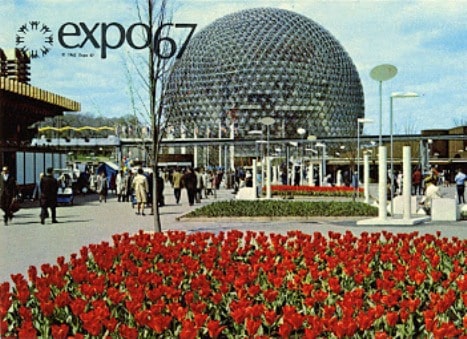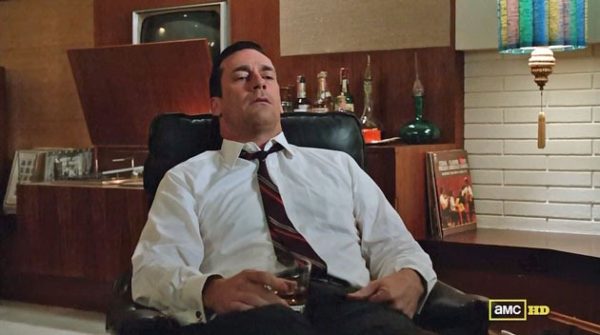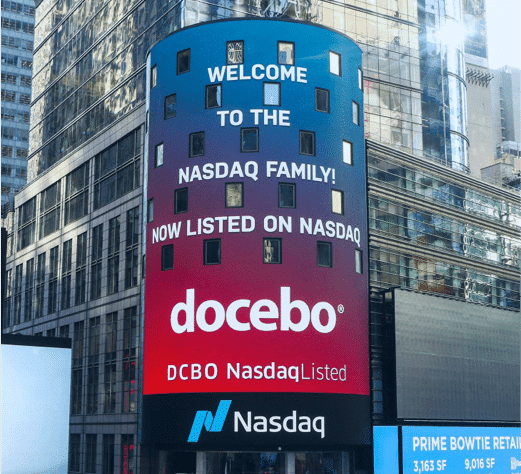

With a new season of American hit serial Mad Men upon us, it feels like a good time to reflect on what the future used to look like.
Depicted in the mass media of that time, the future was nearly pure optimism, if a little technocratic. Yesterday’s tomorrow had dreams of people-movers, teleconferencing, and hovercrafts working together in harmony, sending you on to your next appointment flying over the clean, tube-laden city.
And then, maybe somewhere in 1967, that vision all falls apart. In an episode of Mad Men from last season, Don Draper sits in a sturdy leather chair and pops on one of his wife’s records, The Beatles’ “Tomorrow Never Knows” (which still sounds futuristic). A look of bored irritation creeps across his face as he stands to lift the needle off the turntable. But the genie is already out. The future no longer belongs to him, as it did just a year earlier. He’s a relic.
Draper’s world must have seemed like a meritocracy, a world in which any white, middle-class, presentable young man could be hired in to a large company or the civil service on not much more than a handshake and installed into a job-for-life. Hippies were building communes. Salman Rushdie once described in an interview how he and a long-haired friend drove a van down through Europe to Afghanistan, eager to see the world and the world eager to meet them. Try doing that same trip today.
In 2017, a mere five years from now, Montreal will be celebrating the 50th anniversary of Expo ’67, a perfect storm of hippy idealism and techno-futurism, featuring a Buckminster Fuller geodesic dome, which I see in the distance every morning when I step out my door, forlornly beckoning all who see it back to the future. We may be experiencing Trudeau-mania again, but things have changed.
We have spent the last 50 years cultivating a dystopian future, coloured by our disillusionment. In some versions, robots will turn on us and try to kill us, no matter how cute or helpful they may seem at first. Good luck popularizing the driverless car in that atmosphere.
In the film, 2001: A Space Odyssey (released in 1968), we see an almost perfect future; one of hot-cooked meals appearing from vending machines, a father having a birthday teleconference (or Skype) with his young daughter, and astronauts watching the news from Earth on their Newspad. In one of the film’s more memorable set pieces, a stewardess grabs a fountain pen floating above the middle aisle and gingerly places it back in the jacket pocket of a sleeping passenger. Also, there’s a computer in the film that goes nuts and starts killing people.

In devices like Google Glass, the Myo armband, and thought-controlled devices like InteraXon’s Muse, we catch little glimpses of a possible future in which human and machine collaborate towards perfectibility, just like in 1967. But we catch it through the fractured past half-century, proceeding from a Madison Avenue ad-man grunting as he listens to The Beatles through the disillusionment of the Vietnam War and the assassination of the most famous civil rights leaders, and then the slash-and-burn 1980s, the complacent and smug 1990s, straight in to nothing less than the reconfiguration of capitalism as we know it. Or whatever it is that has been happening.
While the Japanese apparently have an absolutely unproblematic attitude towards robots, eagerly working them into their daily lives, we have spent the last 50 years cultivating a dystopian future, coloured by our disillusionment. In some versions, robots will turn on us and try to kill us, no matter how cute or helpful they may seem at first. Good luck popularizing the driverless car in that atmosphere.
During the next five years, while Montreal prepares for Expo ‘67’s semi-centennial, we will either show up for the celebration with an attitude of mocking disbelief (“How could they have gotten it so wrong? Look at those haircuts!”) or with a twinge of regret at how we allowed ourselves to feel so hard done by reality. Do we embrace a future of optimism? Or do we keep heading straight towards our seemingly inevitable Road Warrior-like future? You’ve got five years to decide. We can meet and talk about it at Expo.
Leave a Reply
You must be logged in to post a comment.



 Share
Share Tweet
Tweet Share
Share




Comment